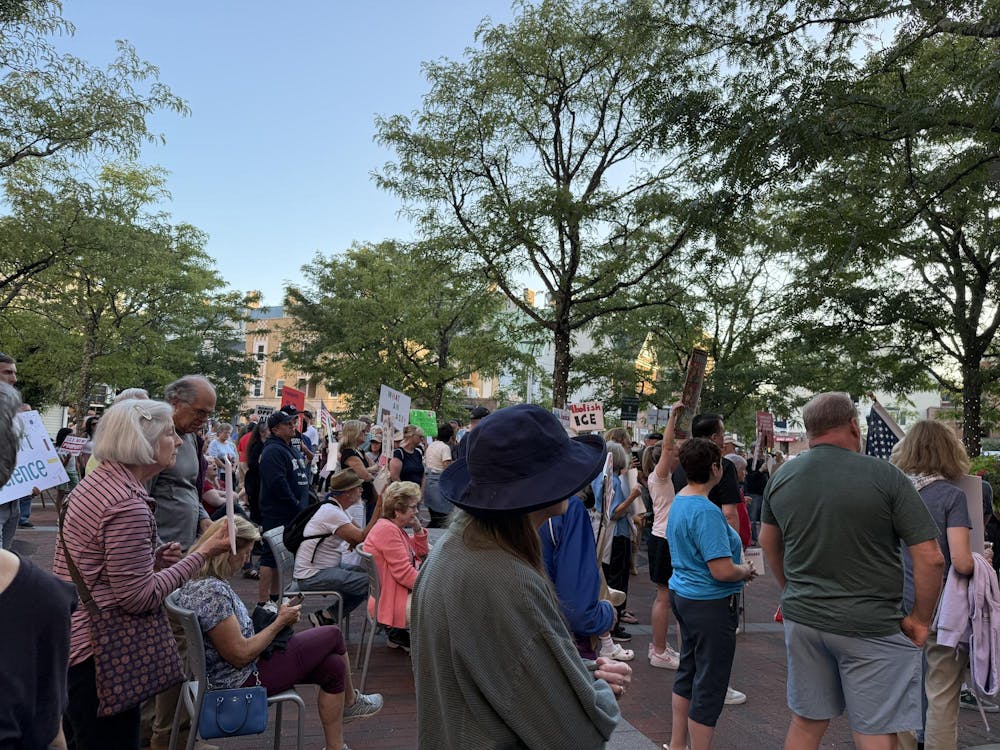Around 200 family members, friends, and colleagues of Xiyue Wang GS gathered at a candlelit vigil on Friday night in his honor. Wang is a Ph.D. student in the history department and a naturalized U.S. citizen who has been imprisoned in Iran for the last 13 months. An appeal of his conviction and sentence was denied last month.
After more than a year of private bereavement, in addition to unsuccessful work with the University and the U.S. government on securing Wang’s return, his family and friends, including his wife Hua Qu and history adviser professor Stephen Kotkin, publicly addressed the audience to clarify Wang’s situation. They urged others, even those beyond the University community, to keep his imprisonment in the government’s consciousness in hopes of his liberation.
Qu met Wang in Hong Kong in 2009. She was attracted to his endless curiosity, spanning the world’s cultures, languages, and countries. Wang’s curiosity was inextricable from himself as a person. She recounted him taking her to Beijing bookstores and pulling out history books at random, telling her anecdotes and stories about the places on the pages.
“He told me that his intellectual dreams began within these books and that one day he would contribute to a historical field that would matter to all,” Qu said.
The predominantly Muslim countries of Central Asia particularly fascinated Wang. After a brief time with Qu in Beijing, he worked for Red Cross as a translator in the war-zones of Afghanistan. Afterwards, in 2012, they married back in Beijing and had their son, Shaofan. But Wang, a “born academic” in Qu’s words, couldn’t stop thinking about the troubling events he witnessed in Central Asia, and decided to pursue a Ph.D. in Eurasian studies at the University.
His intellectual curiosity entailed a one-year separation from his wife and newborn child, but the family held steady in their commitments both to one another and to academic pursuit. Wang’s intellectual ambition and love for studying the Islamic world were, however, undiminished by his difficult situation. His adviser, Kotkin, remarked on Wang’s “astonishing intellectual curiosity and ambition.”
“He set out on a Ph.D. project to compare governance of predominant Muslim regions in multiple states,” Kotkin said. “His erudition of study covers Afghanistan, Iran, Russia, Turkistan, all the way to the Ottoman Empire … That’s why he went to Iran because he wasn’t satisfied with a small single-country study, as important as that could have been.”
His friend Zhan Zhang commented that Wang was the ultimate language nerd, at one point learning Manchu, Persian, and Russian simultaneously. Conversations between them were dominated by scholarly topics. All his friends were impressed by his family and its collective willingness to bear the year of distance and loneliness for the sake of academic pursuit and cultural understanding.
One of his professors, Janet Chen in the East Asian studies department, remarked that Wang was unusual among her students for needing to be reminded to slow down his pace and limit his scope, recounting how he at one point was trying to tackle six academic fields at once.
“I remember telling him ‘You have your entire life to be a scholar, slow down a bit,’” Chen said.
At the vigil, people were quick to indicate not only Wang’s rapacious mind, but also his generous and attentive spirit. A friend, Fauzia Farooqui, described a couple days in which Wang stayed at her family’s house upon his arrival at the University.
“I learned that he is not only a very bright scholar; he is a very sensitive person,” said Farooqui, explaining how compassionately Wang treated her special needs son who had just been diagnosed at the time. “Within a couple days, he became my kids’ favorite Uncle Wang,” Farooqui added, “and he is still my kids’ favorite Uncle Wang.”

Another friend and colleague, Elisa Prosperetti GS, offered anecdotes at the vigil of Wang’s deep care for his friends. Twice while Prosperetti was researching in countries roiled by terrorist attacks, once in France and another time in Ivory Coast, she received an email from him within hours of the event asking if she was okay. He even beat her parents. During a particularly lonely birthday, he organized a “Chinese feast” for her and invited their friends.
Wang’s family happily reunited a year later in 2014, lifting his spirits according to his friends. Chen noted how he stood taller and smiled more when Qu and their son Shaofan arrived. Wang proved to be as devoted to family as he is to scholarship. Xue Zhang, a friend and fellow student, related how every day after studying in Firestone, Wang would return home with his son and cook dinner for the family, as Qu came home late from her job working as an attorney in New York City.
“He soon became the best cook among friends and even got a nickname, Cook Wang,” Xue said.
Xue Zhang recounted her favorite memory of the family. Accepting Wang’s dinner invitation, she arrived at their house on a late summer evening in 2015 and saw Wang peeling potatoes while Qu read a book to their child. Their situation finally seemed settled: Wang studying at the University, Qu working in New York, and both raising their child at home.
At 2:20 a.m. on Aug. 7, 2016, Qu awoke to a call from Wang, who was conducting research in Iran. He had been doing research there since May for his dissertation. During the phone call, she learned that three weeks earlier, the police had confiscated his passport and laptop and demanded he leave the country immediately. He was in the process of buying a ticket back home. She sent an anxious text back, but received no reply. Days later, she learned he was held in prison.
They were once again separated by thousands of miles, but this time the possibility of reunion was uncertain. Qu desperately searched for a way to bridge the distance. She became obsessed with Google Earth.
“I zoomed in to examine the landscape and the clusters of gray architecture as if I could find him behind the walls,” she said.
Thus began a grim year for Qu and her son as they tried to maintain their normal life while trying to secure Wang’s release.
“For many months, Wang’s detention was not public knowledge, which meant that Hua had very few people to turn to,” said Jane Manners GS, a friend of the family who spoke at the vigil. The University did not want details to be leaked that might harm efforts to secure his release. “And yet, despite her extraordinarily trying circumstances — living without family in a foreign country, raising a small child, holding down a demanding full-time job as an attorney, all while struggling to make sense of her husband’s situation and figure out what to do to help him, I never once saw her falter or tear up or despair.”
While speaking of how she has managed to survive the ordeal, Qu revealed many vulnerable times when grief and uncertainty overcame her.
“I have learned not to weep every time that I think about him,” she said. “I have stopped imagining how he spends his days and how long the next 10 years may mean to my family.” She expressed particular concern about providing her husband access to medical care as his physical and mental health deteriorates.
But Qu has work through her grief by assuming the role as her husband’s advocate. She is appealing to the University community and the federal government to protect Wang and, in doing so, prove its commitment to “freedom of thought, international scholarship, and cultural understanding that Wang Xiyue embodies,” she said.
While desperate bereavement tinged the speeches as the uncertainty of Wang’s fate hovered, a sense of community permeated as the crowd silently filed out of East Pyne courtyard, holding candles.
“I know that Hua finds your communal support both moving and sustaining,” Manners said. “Going forward, it’s critical that we continue as a community to be there for Hua and Shaofan, showing our support in ways large and small.”








